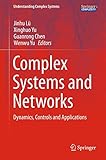Complex Systems and Networks [electronic resource] : Dynamics, Controls and Applications / edited by Jinhu Lü, Xinghuo Yu, Guanrong Chen, Wenwu Yu.
Contributor(s): Lü, Jinhu [editor.] | Yu, Xinghuo [editor.]
| Yu, Xinghuo [editor.] | Chen, Guanrong [editor.]
| Chen, Guanrong [editor.] | Yu, Wenwu [editor.]
| Yu, Wenwu [editor.] | SpringerLink (Online service)
| SpringerLink (Online service) .
.
Material type:  BookSeries: Understanding Complex Systems: Publisher: Berlin, Heidelberg : Springer Berlin Heidelberg : Imprint: Springer, 2016Edition: 1st ed. 2016.Description: VIII, 482 p. 196 illus., 158 illus. in color. online resource.Content type: text Media type: computer Carrier type: online resourceISBN: 9783662478240.Subject(s): Dynamics
BookSeries: Understanding Complex Systems: Publisher: Berlin, Heidelberg : Springer Berlin Heidelberg : Imprint: Springer, 2016Edition: 1st ed. 2016.Description: VIII, 482 p. 196 illus., 158 illus. in color. online resource.Content type: text Media type: computer Carrier type: online resourceISBN: 9783662478240.Subject(s): DynamicsDiscovering Cluster Dynamics Using Kernel Spectral Methods -- Community Detection in Bipartite Networks: Algorithms and Case Studies -- Epidemiological Modeling on Complex Networks -- Resilience of Spatial Networks -- Synchronization and Control of Hyper and Colored Networks -- New Nonlinear CPRNG Based on Tent and Logistic Maps -- Distributed Finite-time Cooperative Control of Multi-agent Systems -- Composite Finite-time Containment Control for Disturbed Second-order multi-agent Systems.-Application of Fractional-order Calculus in a Class of Multi-Agent System -- Chaos Control and Anticontrol of Complex Systems via Parrondo’s Game -- Collective Behavior Coordination with Predictive Mechanisms -- Convergence, Consensus and Synchronization of Complex Networks via Contraction Theory -- Towards Structural Controllability of Temporal Complex Networks -- A General Model for Studying Time Evolution of Transition Networks -- Deflection Routing in Complex Networks -- Recommender Systems for Social Networks Analysis and Mining:Precision vs. Diversity -- Strategy Selection in Networked Evolutionary Games: Structural Effect and the Evolution of Cooperation -- Network Analysis, Integration and Methods in Computational Biology.
This elementary book provides some state-of-the-art research results on broad disciplinary sciences on complex networks. It presents an in-depth study with detailed description of dynamics, controls and applications of complex networks. The contents of this book can be summarized as follows. First, the dynamics of complex networks, for example, the cluster dynamic analysis by using kernel spectral methods, community detection algorithms in bipartite networks, epidemiological modeling with demographics and epidemic spreading on multi-layer networks, are studied. Second, the controls of complex networks are investigated including topics like distributed finite-time cooperative control of multi-agent systems by applying homogenous-degree and Lyapunov methods, composite finite-time containment control for disturbed second-order multi-agent systems, fractional-order observer design of multi-agent systems, chaos control and anticontrol of complex systems via Parrondos game and many more. Third, the applications of complex networks provide some applicable carriers, which show the importance of theories developed in complex networks. In particular, a general model for studying time evolution of transition networks, deflection routing in complex networks, recommender systems for social networks analysis and mining, strategy selection in networked evolutionary games, integration and methods in computational biology, are discussed in detail. .


There are no comments for this item.